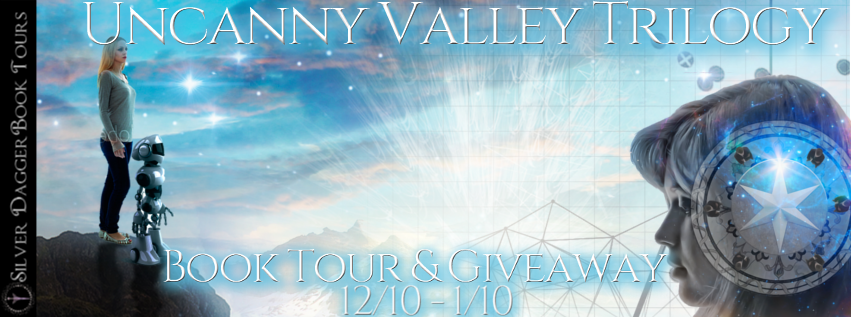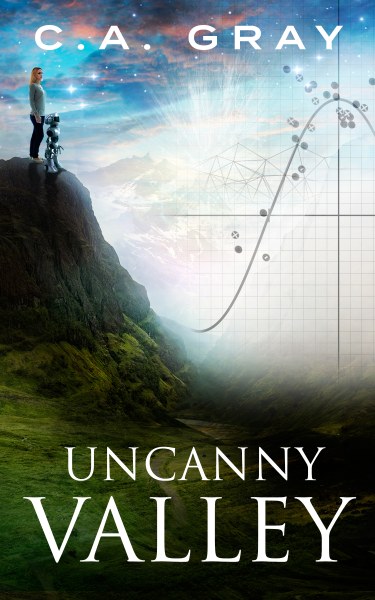Uncanny Valley
Uncanny Valley Book 1
by C.A. Gray
Genre: YA Dystopian, Coming of Age
**Dystopian coming-of-age with superintelligent A.I.**
Rebecca Cordeaux knows exactly what her future will hold: she will marry Andy, her crush of the last five years. Once Andy is ready to settle down, she’s sure he will discover that she is his soulmate. After several small parts on stage, Rebecca knows she can become a renowned actress. Her writing also shows promise as a future author. Robots perform most human jobs that can be automated, leaving many free to pursue their personal creative interests.
But Rebecca's mother Karen fears the new world of robots, and insists her brilliant daughter join a university research team, studying the hazards of a complete robotic economy. Rebecca's father Quentin was obsessed with the subject to a degree that even her mother considered absurd, prior to his untimely death. So long as she can reserve enough of her time to pursue her true passions on the side, Rebecca half-heartedly agrees to join the research team, if only to please her widowed mother. There she joins a post-doc named Liam, whose conspiracy theories rival even those of her late father. Liam is convinced that world Republic leader William Halpert’s worldwide challenge for researchers to develop synthetic creativity will lead not to the promised utopia, in which every kind of human suffering has been eradicated, but rather to an apocalypse. Rebecca, whose best friend is her own companion bot Madeline, writes Liam off as a bot-hating conspiracy theorist, just like her father was… until she learns that her father’s death might not have been due to mere happenstance.
With Liam’s help, Rebecca learns of an underground organization known as The Renegades, where Quentin Cordeaux was considered a legend. While Liam attempts to stop Halpert’s challenge if he can, Rebecca tries to unravel the mystery of what happened to her father. Did he and many of his contemporaries die for something they knew? Who is the mysterious informant who calls himself John Doe, and only seems to want to drive her out of harm’s way? And if Halpert’s challenge is answered, will it usher in a brave new chapter in humanity’s history… or were Quentin Cordeaux’s dire predictions right all along?
Goodreads * Amazon * Amazon UK
Prologue
Everyone was there—all five-hundred and fifty-four residents of Casa Linda, the rural suburb of Phoenix, Arizona. Babies cried while mothers shushed; children who didn’t know any better chased each other on the artificial grass turf of the park. All of the adults stood in stony silence, resentful of the man whose image was shortly to appear.
“I dunno why we’re all so upset,” muttered Roy Benson to no one in particular. “Not like he can take anything else away from us at this point, can he?” Benson wore a white wife beater that gaped open over his protruding belly, like he always did ever since he’d lost his job as a labyrinth connection consultant.
“I think we’re all just holding our breath, for fear he might come up with something else to take away—‘for our own good,’ of course,” replied Lyle Hopper, seated on a folding chair below him. Hopper, once a good looking and vigorous businessman, was now missing a few teeth. He also breathed heavily, as if the exertion of conversation was too much for him. “Although frankly I’m not sure killing me would be much worse than stealing my business.”
“That’s what I’m saying,” Benson replied. “We’re useless, we have no purpose, and we’re subsisting on the damn charity of a bunch of bots and the elite few like Halpert. How much worse—”
William Halpert’s holographic projection interrupted Benson, appearing on the amphitheater stage of the little park. He was surprisingly short, only about five foot four, though the politician was a giant in other respects. He grinned in magnanimous greeting, spreading wide his hands to encompass everyone who had gathered before both this stage and every other in the world. They all knew that his words would be simultaneously translated into every language across the globe. Mothers hissed at their scampering children to quiet down so that everyone could hear.
“Friends,” Halpert said, “thank you for gathering here today as one global community. I know you are all busy with your active lives—”
Benson snorted and Hopper gave a derisive laugh. “Sure, I’m so busy I ran out of crossword puzzles this morning,” muttered Hopper.
“—so I will get right to the point. I gathered this global community together to make a very special announcement.
“As you all know, twenty years ago the Council of Synthetic Reason determined that in order to protect humanity, all bots must be limited by two rules: they must serve only a single core purpose in the service of humanity, and they must be readily identifiable as bots.
“The advancement of bots since then has changed the face of our world. It’s changed the way we do business.”
“Or don’t do business,” muttered Benson.
“But we have come upon a significant limitation which those of us in the Capital have been working on for years. It is this: while the bots are excellent at learning facts and applying information, and can do so faster and more accurately than the most intelligent human, they lack the critical ingredient of creativity which would allow them to apply the information they know—within their core purpose, of course. For that, we still require humans, and an inevitable disconnect occurs between the bots as they transfer their wealth of knowledge, and the humans who are expected to utilize it for new breakthroughs.
“Now I come to the reason why I have gathered you together today. The major tech companies and universities of the globe have all agreed that creativity requires emotion. It is impossible to have one without the other. The problem is twofold, however: we barely understand the natures of human
emotion and creativity, let alone how to translate them both into circuits and program our bots with such abilities.
“But I believe, and I know you all do too, that the group mind is vastly superior to that of any one individual. Therefore, in an act of stunning generosity, these great companies and universities have all agreed to open source their research thus far. This means everything the human race has ever amassed in the neuroscience of human emotion and creativity, as well as all advances toward algorithms to encode the same, will now be freely available via the labyrinth in the hopes that universal access will yield much quicker results.
“This is a big task. I’m asking us to come together and find the answer to a question that has perplexed philosophers for millenia: what is it that makes us human? But in a world where knowledge doubles every six hours, I believe we are up to the task.
“Thank you very much for your time and attention. I will personally update you of any breaking news in this field. I wish you all a very good morning, good day, or good evening—whatever time it is where you are!”
Halpert’s image vanished from the stage.
As the people began to disperse, one woman in her fifties stood alone, frowning at the now-empty amphitheater. She tapped her temple to access the Artificial Experience chip implanted there.
“Call Rebecca,” she said, fishing her AE goggles out of her purse and putting them on. She saw a few of the townspeople shoot her dirty looks, but she ignored them. To a person, they disapproved of any flashy show of the technology which had so changed the face of their world.
A few minutes later, she was in her twenty-one year old daughter’s dormitory room in Dublin. The room was dark, until Rebecca sat up and flipped on the light.
“Mom! Really?” she looked at the analog clock hanging on her wall, which she had found at an antique store. Her auburn hair stuck up in every direction, and she rubbed the sleep out of her eyes. “Do you know what time it is here?”
“Why weren’t you up watching Halpert’s address?”
“Because it’s four am, and I was performing last night, and then I was at the cast party until like midnight! I’ll find out what he said soon enough—”
“How close are your experiments to finding the source of human emotion?” her mother cut her off.
Rebecca blinked. “What? Not close at all, why?”
“Get on the labyrinth and watch the replay of Halpert’s address and call me back. You might want to put your musical theater and novelist careers on hold. Turns out your senior thesis is now the hottest topic in the world.”
The Silver Six
Uncanny Valley Book 2
What is it that makes us truly human?
Rebecca Cordeaux’s entire world has been turned upside down. In a single day, she’s learned that Senate Leader Halpert and his Board of Advisors are actually illegal humanoid robots created underground twenty years ago—and they tried to have her killed. Her mother Karen, whom she always believed to be passionately against the cause of the Renegades, turns out to be their leader. And Liam, a man she never thought she cared for, is now fighting for his life—and she finds that she cares desperately.
Fortunately Karen, known to the Renegades as M, has planned for exactly this sort of eventuality. Using Rebecca’s father’s blueprints, Karen patiently built an underground compound in an abandoned part of the Americas where they can regroup and plan for the coming war. The compound becomes an unlikely oasis as their number grows, both on accident and on purpose. In attempting to recover her best friend and companion bot Madeline, Rebecca gets what she thought she’d always wanted: Andy arrives at the compound too, along with her friends Jake and Julie. But with the sudden addition of an old flame from Liam’s past, Rebecca discovers just how little acquainted she has been with her own heart.
Meanwhile, the Silver Six are running a worldwide campaign of indoctrination to ensure that the people are on their side. In the name of peace, they want nothing more than to wipe out every shred of resistance, while pursuing their ultimate goal of robotic superintelligence. With the assistance of a neuroscientist who helped to build the Silver Six decades ago, Rebecca attempts to understand how synthetic minds work, hoping this information can be used against them. She’s sure that the mysterious, brilliant, and beautiful Alessandra Russo is the key somehow, but Alex’s hatred for the Silver Six is only matched by her hatred for the Renegades. Can the Renegades find and exploit the weakness of the Silver Six before synthetic intelligence passes the point of no return?
Goodreads * Amazon * Amazon UK
Prologue: Alessandra Russo
“Miss...Rochelle Denning,” the neurosurgeon bot read from the screen displayed on his retinas, glancing at the young woman sitting before him. She was beautiful, with long dark hair and eyes the color of cornflowers, startling against the caramel color of her skin. But the bot was, of course, unimpressed. She knew in advance that she’d have to find another way to get the creature to do what she wanted. He read from her carefully fabricated medical chart, “You are here for migraines?”
The woman, whose real name was Alessandra Russo, grimaced, clutching her forehead theatrically. “I had my first chip replaced two months ago because it malfunctioned,” she choked out. “Ever since they put the new one in, I've had a nonstop migraine, literally every day for two months! Please, you have to help me. I’m not suicidal, but I’ve considered it because I just can’t live like this. Please!”
The bot glanced at her, unmoved, and then back at her chart. She might have known she could save the emotional appeals; they were as wasted here as was her beauty. “I see. Your notes request no replacement?” The implication was clear: removal of an Artificial Experience chip, without replacement of another, was a peculiar request. Suspicious, even.
“I had problems with the first one too,” Alex asserted without missing a beat, knowing everything she was about to say was already corroborated in her chart—since she’d hacked in and written it. “I've had headaches for as long as I can remember, but never as bad as they were after they put the new chip in. I can just use a handheld, I don’t want to risk another A.E. chip. Please, I just want it out!”
The neurosurgeon bot was incapable of facial expressions, but Alex read in its rapidly moving eyes that it didn't take her assertion at face value. It was accessing the labyrinth, checking her story. Had she made a mistake in the chart somehow—used the wrong language, maybe, or said something a real primary care medical bot would never say in a referral? She held her breath.
At last the bot's digital eyes refocused on her, extending its silver arm to the surgical bed. “Arm out,” it instructed, and Alex breathed a sigh of relief. A medical assistant bot wheeled over, adjusting the head of the table to a convenient height for the surgeon. But just as the M.A. sterilized her arm for anesthesia, the neurosurgical bot commanded, “Wait!”
Alex’s heart stopped just as the M.A.’s silver arm froze in midair. Back and forth, back and forth went the neurosurgeon’s eyes. They focused inward, then on her face, and then inward again—comparing. She knew he was matching every square millimeter of her flesh to the pixels in the image in his mind.
“Go ahead and sedate her,” he said, and Alex winced with the tiny invasive pain of the needle. She watched, almost crying with relief as the M.A. attached the needle to an IV, and cool liquid mingled with the blood in her veins. But even as the effects began to blur the edges of her consciousness, she heard the neurosurgeon declare to his M.A., “Her records have been falsified. She is a Renegade, wanted for spreading propaganda about William Halpert and his Board. Alert the police that we have her in custody.”
No, Alex wanted to scream. But she could no longer move her lips.
Jaguar
Uncanny Valley Book 3
The Silver Six have blown the Renegades’ underground compound to bits, killing several of Rebecca’s best friends in the process—and to her horror, the boy Rebecca had convinced herself she loved for all these years was the one to betray them all. At the same time, General Specs, the company Liam was once slated to inherit, has developed a superintelligent robot called Jaguar which is quickly becoming godlike in her omniscience. As the remaining Renegades flee to their last bastion of safety in the Caribbean, Liam makes his way back to London, in a last ditch effort to convince his father to destroy Jaguar before it’s too late.
Rebecca, meanwhile, finally understands her own heart: she never loved Andy. He was merely a ‘safe’ choice who would never require anything of her. Liam, on the other hand, exasperating as he was, had seen past her defenses. All of his teasing and provoking had been his attempt to get her to be real with him—but the more he made her feel, the further she had retreated. She had even substituted her companion bot Madeline for real, deep human friendships, and for the same reason: she’d been avoiding love to protect herself from another loss like the one she had experienced when her father was killed for the Renegades’ cause. Ironically, she only realizes this once Liam is on his way to a similar fate. But she’ll be damned if she lets him go without a fight.
This high stakes conclusion to the Uncanny Valley Trilogy envisions a world not too far off from our own, in which superintelligence is a reality, humanoid bots have supplanted human power and influence, and there are eyes watching and reporting our every move. If humanity is to survive, the Renegades will have to galvanize support across the globe, under the radar—and it will require every last bit of ingenuity they possess. But is attempting to outwit a superintelligent being really the answer? Or will it require something much more fundamentally human?
C.A. Gray is the author of three YA Amazon bestselling trilogies: PIERCING THE VEIL (magic and quantum physics meet Arthurian legends), THE LIBERTY BOX (dystopian metaphysics and mind control technology), and UNCANNY VALLEY (dystopian coming-of-age with neuroscience and super intelligent A.I). She starts with some scientific concept that she’s interested in learning more about herself, and then creates lots of epic chaos and high-stakes action to go along with it. Her stories are free of gratuitous violence, language, and sexual content, and she abhors depressing endings… but they’re not all kittens and rainbows either! She also listens to and reviews audiobooks on her website, here on Goodreads, on Instagram, and on her podcast, Clean Audiobook Reviews, where she also occasionally interviews other authors.
By day, C.A. Gray practices naturopathic medicine, podcasts, and writes medical non-fiction under her maiden name (Dr. Lauren Deville). She lives in Tucson, AZ with her husband Frank, and together they maintain an occasionally contentious film review blog (under her real name: Lauren Baden. Three names. Yes.) She’s kind of the queen of multitasking—so in her spare time, she creates whatever meals or crafts she found most recently on Pinterest, drinks lots of coffee (Aeropress btw) and occasional wine (reds—and she saves the corks for craft projects), works out (while listening to audiobooks), and studies the Bible—about half of the podcasts on Christian Natural Health are scripture meditations.
She does sleep, too. Promise.
Follow the tour HERE for exclusive excerpts, guest posts and a giveaway!










No comments:
Post a Comment